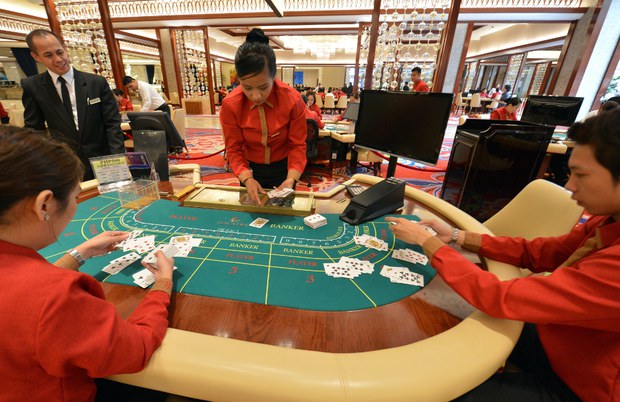Philippine Vice President, Defense Chief Voice Concerns Over Chinese Casino Workers
2019.08.16
Manila
 Employees of the Solaire Manila Resort and Casino in Manila check gaming cards during a media day ahead of the grand opening of the U.S. $1.2 billion casino, March 14, 2013. [AFP]
Employees of the Solaire Manila Resort and Casino in Manila check gaming cards during a media day ahead of the grand opening of the U.S. $1.2 billion casino, March 14, 2013. [AFP]
The Philippines’ second highest official expressed alarm Friday over an influx of Chinese workers, while the country’s defense chief warned that casinos known to employ citizens of China could pose an espionage risk for military and security installations nearby.
Vice President Leni Robredo said many of the workers here were mostly employed by Philippine Offshore Gaming Operators (POGOs) and had entered the country without permits.
She said the government should review its policies toward Chinese workers, particularly those working at casinos.
“I think we really need to go over our policies and check who are here, what they are doing here, and if their lengthened stay is legal,” Robredo said.
She also called for a “temporary halt” to the entry of Chinese workers into the Philippines.
Meanwhile, Defense Secretary Delfin Lorenzana suggested Friday that offshore gaming operators, which employ many Chinese nationals who cater to gamblers flying in from mainland China, could be used to spy on the Philippines.
“It’s very easy for these people to shift their activities to spying, if that is the intention,” Lorenzana told reporters, referring to POGOs and their proximity to military installations such as Villamor Airbase near Manila’s Ninoy Aquino International Airport.
A day earlier, Lorenzana told reporters that the defense department was checking into whether Chinese-dominated gaming operations in the Metro Manila area could create risks for national security.
Data from the Philippine Bureau of Immigration and the Department of Labor and Employment show that an estimated 200,000 Chinese nationals are working in the country. Many of them are employed in the gaming industry, including in online casinos catering to Chinese nationals – an activity prohibited in China.
The vice president and defense secretary made their comments ahead of President Rodrigo Duterte’s scheduled visit to China later this month, when he is expected to discuss with Chinese leaders in Beijing a territorial dispute with the Philippines in the South China Sea.
The trip to Beijing will be Duterte’s fifth in his three years as president. He is expected to raise a 2016 ruling that invalidated China’s claims in the sea in favor of the Philippines.
The territorial wrangling had earlier soured bilateral ties, but when Duterte became president three years ago, he shelved the ruling as part of steps to appease China. Chinese leader Xi Jinping had warned him about insisting on the Philippine claims, Duterte said, and instead of pressing China on the issue the president invited more Chinese investments here.
Some opposition lawmakers have also voiced concern over the influx of Chinese workers.
“They look like military men who sport clean haircuts and are physically fit like soldiers,” Eric Pineda, a member of the House of Representatives and a member of the opposition, said on Friday.
Last month, National Security Adviser Hermogenes Esperon told reporters in Manila that the large number of Chinese here posed a potential risk and threat to the country.
“I have a tendency to look at it as a threat. I’m on the cautious side because when foreigners, regardless of nationality, come in, and their intent is not clear, and when some of them are undocumented or have false documentation … some come as tourists [and] then end up as workers,” Esperon had said.
“You’d also start getting worried when a whole building [or] condominium tower is occupied by only one nationality, where you would not be able to guard all their activities. Some unwelcome activities could transpire there, so we need to prevent those,” he added.
On Friday, officials with the Chinese embassy in Manila did not immediately respond to phone calls from BenarNews seeking reaction to the concerns raised by Philippine officials and politicians over the influx of Chinese workers.







